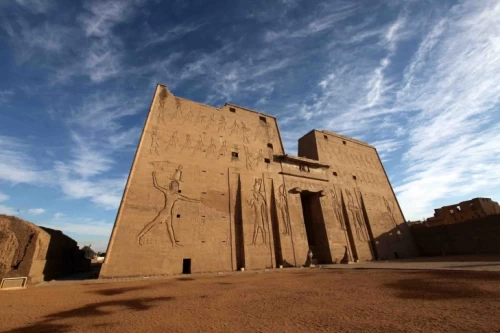Plan your trip to Egypt
In Egypt, you will find the history with the impressive remains from the ancient time, the beautiful landscape, the friendly inhabitants, the interesting customs, the hot and long summer, the mild winter, and the tasty food.
Egypt is a country of contrasts. 90% of the country is desert while along the Nile is rich vegetation.
The biggest part of the country is uninhabited while the cities are overcrowded. There aren’t hippos and crocodiles in the Nile anymore but the fauna is amazing. Lots of people have to face poverty while there is a small opulent elite. You may find international schools with a high-quality education for the minority and packed classrooms in the Egyptian schools for the majority. There are lots of well-educated people with little work possibilities. Despite the difficulties, the people of Egypt are cheerful and optimistic.
Getting There:
By Air..
Egypt is served by international airports at Cairo, Alexandria, Luxor, Aswan, Hurghada, and Sharm EL Sheikh.
By Land:
From Israel via Rafah, Taba, and Eilat. From Sudan by the weekly ferry from Wadi Halfa up lake Nasser to Aswan.
By Sea:
Alexandria and Port Said on the Mediterranean Sea, and Suez and Nuweiba on the red sea are ports of entry.
Entry Regulations:
All travelers entering Egypt must have the appropriate travel documents: a passport with at least 6 months to run and a valid visa.
Lost or stolen passports must be reported to the police immediately. New passports can be issued in a matter of hours at the consular office of your embassy in Egypt, but procedures will require a copy of your police report verifying loss.
Tourist Visas valid for one month are issued at Egypt’s Airports, but may also acquire in advance of your visit at any Egyptian consulate.
The government recently launched a website to obtain your visa online. Try this link to get a visa beforehand https://www.visa2egypt.gov.eg/eVisa/Home
Customs:
A visitor is permitted to enter the country with 250 grammars of tobacco, 200 Cigarettes or 25 Cigars, one liter of alcohol, and personal effects.
Animals must have a veterinary certificate certifying good health and a valid rabies certificate.
What to bring:
Almost everything is available in Cairo and the other cities. If you have a favorite brand of protective sun cream, make-up, toothpaste, or shampoo, bring it with you.
What to wear:
It is an affront to appear in a mosque or a church in clothing that is considered immodest.
Leave your synthetic at home as they will prove too hot in summer and not warm enough in winter. Cotton is suitable for all the seasons, wool for winter.
Hats are vital to protect against heat stroke, as are the sun glasses.
Bring comfortable shoes, you will be doing a lot of walking.
Disabled Facilities:
Some public buildings provide special facilities for the infirm or disabled in Egypt, but things are slowly changing. But you will find some people to help.
Most airports in Egypt are now equipped with ramps and lifts. Many five stars hotels have rooms equipped for the disabled.
Money:
There are some banks at the airports offering currency exchange facilities.
The Egyptian money comes in the following denotations:
200, 100, 50, 20, 10, 5, 1. Pounds.
Piaster coins: 20, 25, 50 and 1 Pound.
Credit cards are used in most major hotels and shops. Travelers’ cheques are widely accepted, ATM machines are now everywhere.
Drinks & Foods:
It is not allowed for the tourists to drink from the taps in their hotels or cruise ships, it must be bottled water.
The hotels & cruises offer a very good collection of Egyptian traditional drinks such as Hibiscus, aniseed, fenugreek, and mint tea plus the other kinds of coffees.
Fresh juices such as Orange, Mango, Strawberry, Pomegranate, or whatever depending on the season, are available everywhere.
A very big range of beer and alcoholic drinks is available at the hotels, cruises, and nightclubs.
Egypt has an endless variety of dishes, hot and cold.
Some of the most common dishes are:
Tahina (a sesame paste mixed with water, oil & lemon juice) served as a dip or sauce.
Babaghanog (is a tahini mixed with garlic and roasted eggplant).
Taamiya (deep fried fava-bean balls).
Kofta (is minced meat).
Photography:
Egypt is a photographer’s paradise .
Photography is forbidden in security zones, and some tourist sites such as the Valley of the Kings, the Egyptian Museum, and some other sites.
Signs are usually posted in restricted areas.
In other areas, photography is permitted for free and some for a fee. For still cameras run as high as 500 L.E, for video cameras up to 1000 L.E.
Scholars and professional photographers working on a project may apply for a special permit from the Supreme Council of Antiquities.
Photographing individual people requires a bit of consideration, you have to ask them if they want or not.



-webp.webp)



-webp.webp)
-webp-webp.webp)
-webp-webp.webp)
-webp-webp.webp)
-webp-webp.webp)
-webp-webp.webp)
-webp-webp.webp)
-webp-webp.webp)
-webp-webp.webp)
-webp-webp.webp)
-webp-webp.webp)
-webp.webp)
-webp-webp.webp)
-webp-webp.webp)
-webp.webp)
-webp.webp)
-webp.webp)
-webp-webp.webp)
-webp.webp)
-webp-webp.webp)
-webp.webp)
-webp.webp)
-webp.webp)
-webp.webp)
-webp.webp)
-webp-webp.webp)
-webp-webp.webp)
-webp-webp.webp)
-webp-webp.webp)
-webp-webp.webp)
-webp-webp.webp)
-webp-webp.webp)
-webp.webp)
-webp-webp.webp)
-webp-webp.webp)
-webp-webp.webp)
-webp-webp.webp)
-webp-webp.webp)
-webp-webp.webp)
-webp-webp.webp)
-webp-webp.webp)
-webp-webp.webp)
-webp-webp.webp)
-webp-webp.webp)
-webp-webp.webp)
-webp-webp.webp)
-webp-webp.webp)
-webp.webp)
-webp.webp)
-webp.webp)
-webp.webp)



